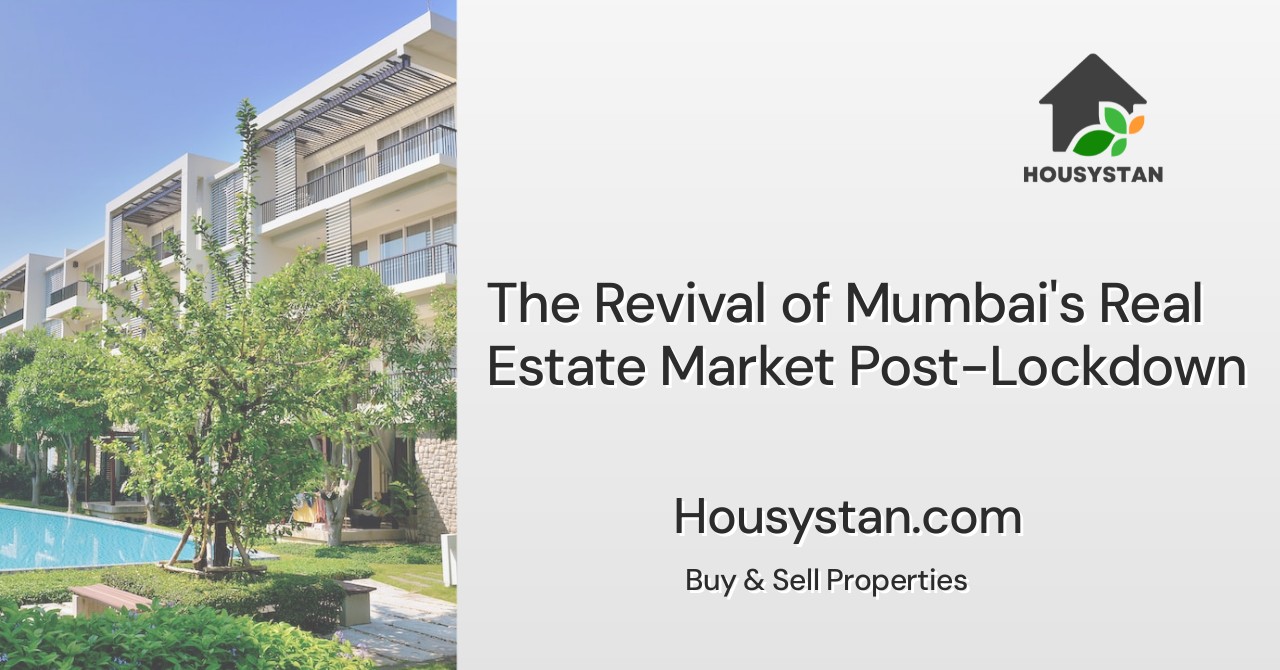The Revival of Mumbai's Real Estate Market Post-Lockdown
Read latest blogs and articles from Housystan

The Information mentioned here was last updated on:
29/1/2026Reviving Mumbai's Real Estate Market Post-Lockdown: A New Dawn
The bustling city of Mumbai, often referred to as the financial capital of India, has seen a transformation of sorts in its real estate market following the post-lockdown era. This resurgence offers fascinating insights into the dynamics of urban development and economic recovery. In this exploration, we'll delve deep into what's driving this revival, the key trends shaping the landscape, and what potential homebuyers and investors should know.
The Impact of Lockdown on Mumbai's Real Estate
- Verified Tenants/Buyers
- Unlimited Property Listing
- Zero subscription/charges fee
The Covid-19 pandemic and subsequent lockdowns brought much of Mumbai's vibrant real estate market to a standstill. During this period:
- Construction Projects Halted: Many ongoing construction projects faced significant delays due to labor shortages and supply chain disruptions.
- Sales Slump: With uncertainty gripping the economy, both buyers and sellers were hesitant to make any moves, resulting in a slump in property sales.
- Price Fluctuations: There was a temporary dip in property prices due to decreased demand and financial instability among potential buyers and developers.
Factors Fueling the Revival
As the city recovers and adapts to the post-lockdown reality, several factors have contributed to the revival of Mumbai's real estate market:
1. Government Initiatives
The government's proactive steps have played a crucial role in rejuvenating the market. Key measures include:
- Stamp Duty Reductions: The Maharashtra government temporarily reduced stamp duty charges, making property purchases more appealing and affordable.
- Affordable Housing Schemes: Incentives for affordable housing projects have spurred both supply and demand, opening up opportunities for first-time homebuyers.
2. Infrastructural Developments
Mumbai’s infrastructure is constantly evolving, with new projects driving interest in real estate:
- Metro Rail Expansion: The expansion of the metro network is improving connectivity, making previously underdeveloped areas more accessible and attractive for residential and commercial investments.
- Coastal Road Project: This ambitious initiative aims to ease traffic congestion, further making certain areas more desirable.
3. Shift in Buyer Preferences
The pandemic has significantly altered what people prioritize in their homes:
- Demand for Spacious Homes: With remote work becoming a permanent option, there is a growing demand for larger homes with dedicated workspace.
- Increased Interest in Peripheral Areas: People are increasingly considering suburbs and nearby towns for their affordability and larger living spaces.
Current Trends in the Market
Several trends are currently shaping Mumbai's real estate scene:
1. Rise of Sustainable Living
There is a marked shift towards sustainable and eco-friendly housing, driven by increased environmental awareness:
- Green Certifications: Developers are striving to achieve green building certifications, which appeal to environmentally conscious buyers.
- Energy-efficient Designs: New projects are incorporating energy-saving features and sustainable materials.
2. Technology-Driven Solutions
Technology is playing a transformative role in the real estate industry:
- Virtual Tours and Digital Transactions: The digital shift has enabled potential buyers to view properties and complete transactions online, streamlining the buying process.
- Smart Home Features: Properties equipped with smart home technology are gaining popularity, enhancing convenience and security for residents.
3. Investments in Commercial Real Estate
Commercial real estate is seeing renewed interest as businesses adapt to new norms:
- Flexible Workspaces: The demand for co-working and hybrid office spaces is on the rise, accommodating the diverse needs of businesses.
- Retail Revival: Retail spaces are bouncing back as consumer confidence returns, attracting both local and international brands.
Strategic Areas for Investment
For those considering investing in Mumbai's real estate, certain areas are emerging as hotspots due to their growth potential and strategic advantages:
1. Thane
As one of the fastest-growing areas, Thane offers:
- Affordability: Compared to central Mumbai, Thane provides more affordable housing options.
- Connectivity: Improved infrastructure and connectivity to Mumbai via the Eastern Express Highway and the upcoming metro line are key incentives.
2. Navi Mumbai
Known for its planned layout and robust infrastructure, Navi Mumbai is:
- Ideal for Families: With ample green spaces, reputed educational institutions, and healthcare facilities, it is increasingly preferred by families.
- Economic Hub: The presence of multiple IT and business parks boosts both residential and commercial real estate.
3. Peripheral Suburbs
The outskirts of Mumbai, including areas like Vasai-Virar and Panvel, are becoming popular due to:
- Growing Infrastructure: Upcoming transportation projects are enhancing their appeal.
- Cost-Effectiveness: They offer larger living spaces at a fraction of the cost compared to central areas.
Future Outlook
As Mumbai continues to navigate the post-pandemic landscape, the real estate sector is poised for further growth. Key factors that will influence this progression include:
- Policy Changes: Continued government support and favorable policies will be vital for sustained growth.
- Economic Recovery: The overall economic recovery and job creation will directly impact buyer confidence and market trends.
- Technological Integration: Further integration of technology will streamline processes and offer enhanced experiences for stakeholders at all levels.
In this dynamic environment, staying informed about the latest developments and understanding the evolving market dynamics will be crucial for both buyers and investors looking to make informed decisions. Proven strategies, such as considering upcoming infrastructural projects and focusing on sustainability, will serve as guiding principles in navigating Mumbai's vibrant real estate market.